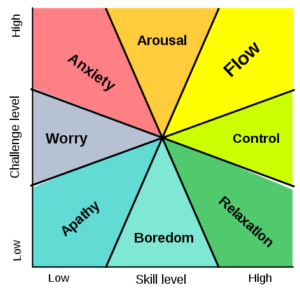Have you ever been so absorbed in a task that time just seemed to fly by? You were so immersed that it was just you and the moment and everything else ceased to exist.
It’s called being in “the zone”, or flow. A state that has been described many times by athletes, artists, and yes….even doctors. It’s often described as the state of optimal experience. We are often our happiest, when we are in flow.
What exactly is flow?
Flow is a term coined by the researcher Mihaly Csikszentmihalyi (Chick-sen-mee-high). It’s a state where the degree of skill and the degree of challenge match up in this magic sweet spot. We are concentrating hard and feel challenged, but have enough skill and experience to be able to perform successfully.
This is often represented by the following graph.

On the x-axis is the degree of skill we might possess at a task. It’s important to note that one’s skill level at a task can increase with training. In the medical field, you can think of a medical student as someone that possesses a low skill on a task, say suturing, and perhaps and experienced surgeon as a highly skilled person.
On the y-axis is the degree of challenge that a task requires. Something really easy results in a low challenge level and something more difficult, a higher challenge.
So, basically, if you’re engaged in a task that is easy and unchallenging, you’re often apathetic or bored. If the task is way harder than your skill level, you might be anxious. If you’re really skilled but the task is easy, you might be relaxed. But optimally, the goal is to be engaged in a task that is both challenging and requires the right level of skill that you possess. It’s the perfect combination of mastery and challenge. That’s the sweet spot where flow can occur.
How to get into flow?
According to Csikszentmihalyi, an activity must meet the following conditions in order to potentially lead to a state of flow.
- The activity is done for it’s own sake. Not for any other external reasons.
- There are clear goals, with regular steps to be achieved along the way, and there is immediate feedback
- The challenge of the task is perfectly matched with one’s abilities. It’s not too easy or too hard, but right in that sweet spot.
- The activity requires complete focus of attention.
Then to actually transform into a flow state
- The activity becomes spontaneous
- A feeling of effortless arises
- There is a sense that you are exercising control
What leads to flow?
Really, any potential task can lead to a flow state. In his book, Csikszentmihalyi describes factory workers and people living in poverty entering the flow state. It’s more about your mental state and the challenge at hand then the particular task. Doing the dishes, learning guitar, or throwing a Frisbee can lead to a flow state. How fully can you immerse yourself in a task?
I know that in the Emergency room, resuscitating a critically ill patient is often a flow-creating state for me. It can be a high-stress situation, but if I feel that I possess the right skills and its an appropriate challenge then it can often be enjoyable. Time really does seem to disappear. I feel so focused on the task at hand that there’s no time to think about other things.
Why does this matter?
Flow is considered as a key component of happiness. That means that we are often at our happiest while in the pursuit of a task, or in the midst of a challenge. Partaking in activities that are challenging, and increasing our skills at tasks we find enjoyable are important ways to spend both our work and free time if we want to increase our happiness.
We often believe that we need to “relax” in order to be happy. Veg out. Put on the tube. Take a break. While it’s good to do that once in a while, it’s not the recipe for our optimal happiness. In order to find that, we’ve got to engage our minds or bodies and test our boundaries. We are our happiest when challenged.
“The best moments in our lives are not the passive, receptive, relaxing times. The best moments usually occur if a person’s body or mind is stretched to its limits in a voluntary effort to accomplish something difficult and worthwhile.” –Mihaly Csikszentmihalyi
More about flow, here.


